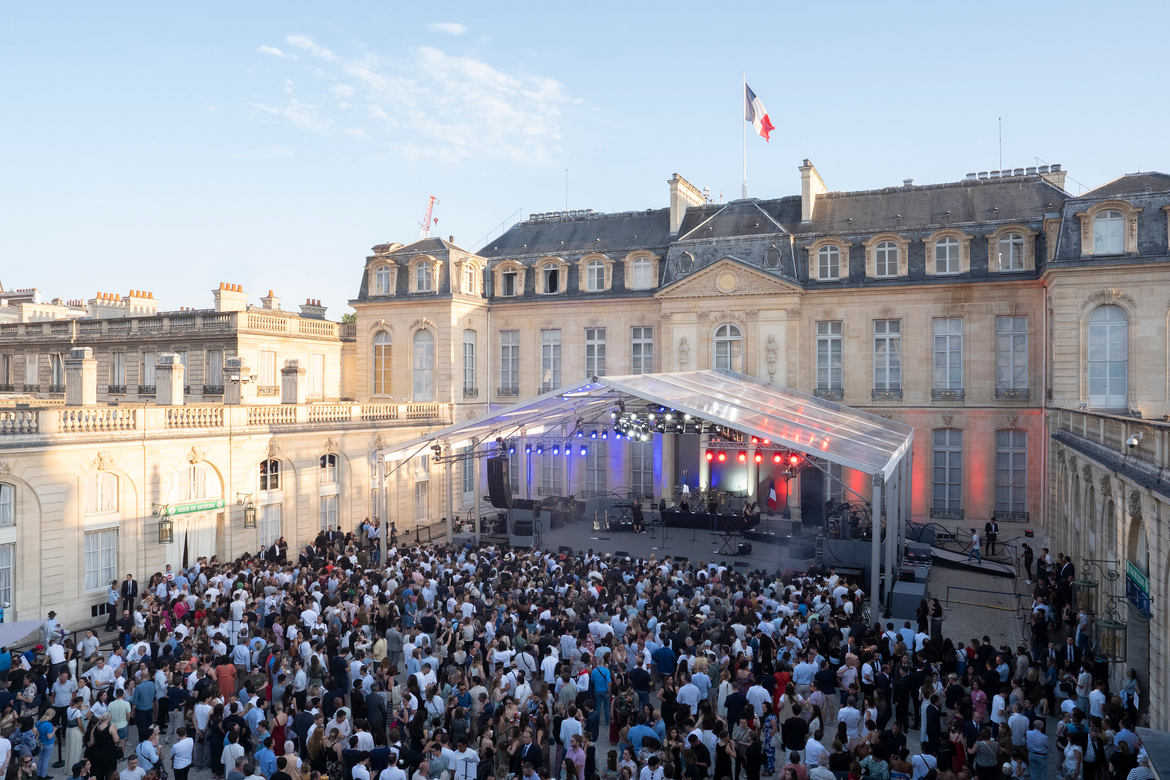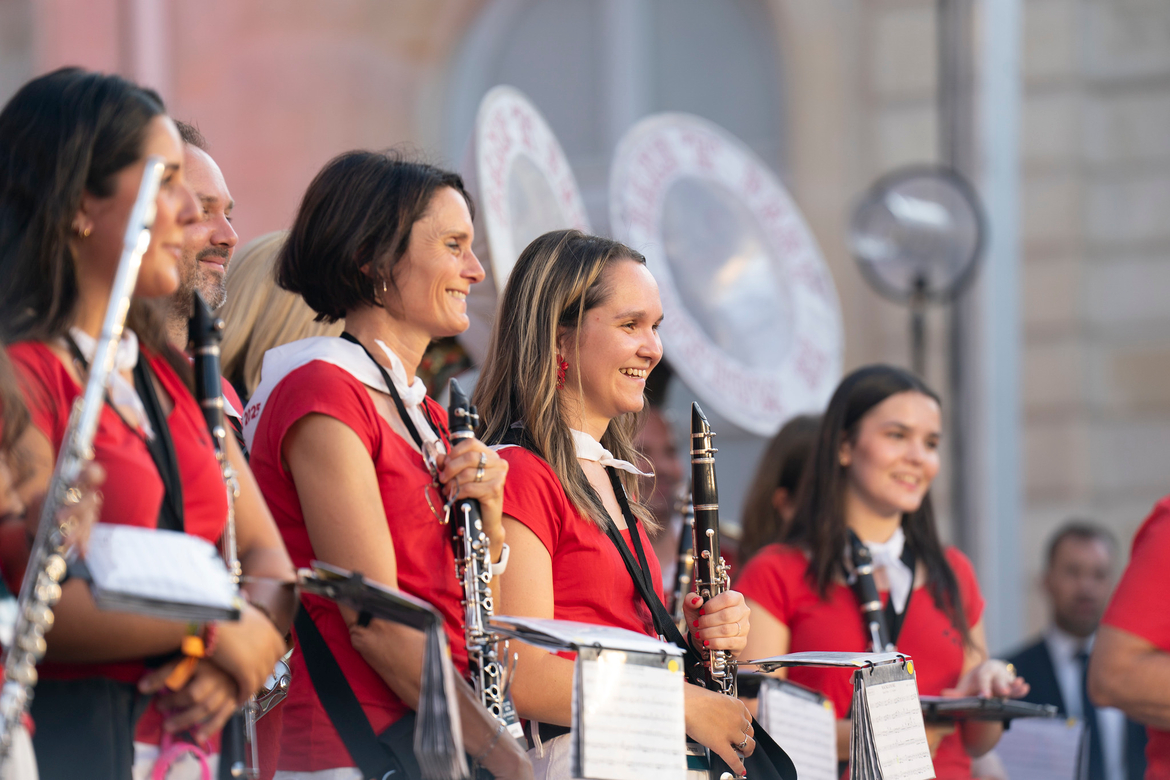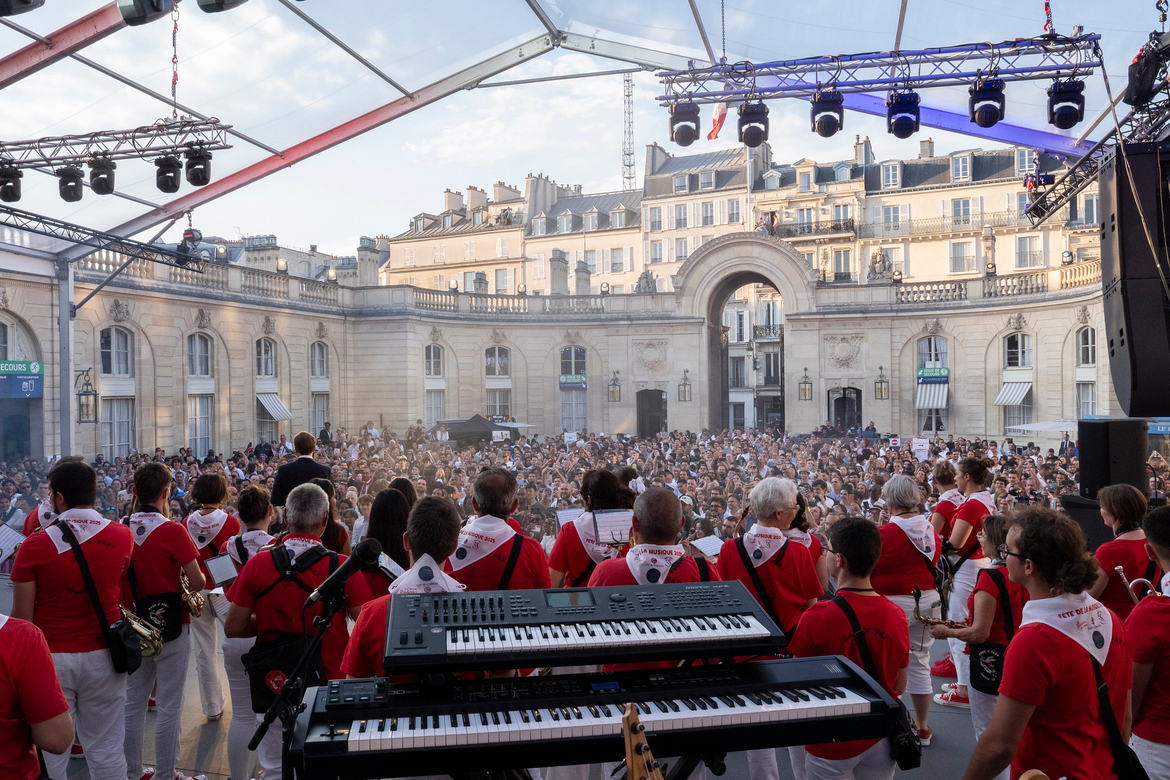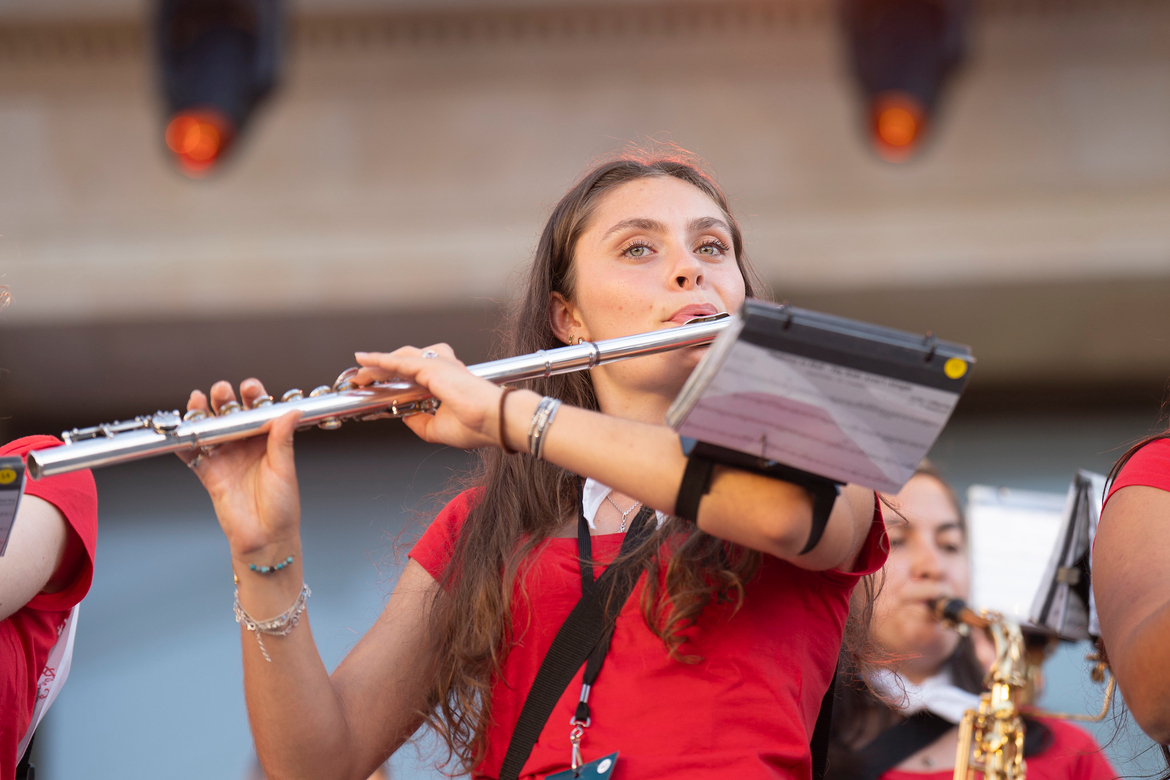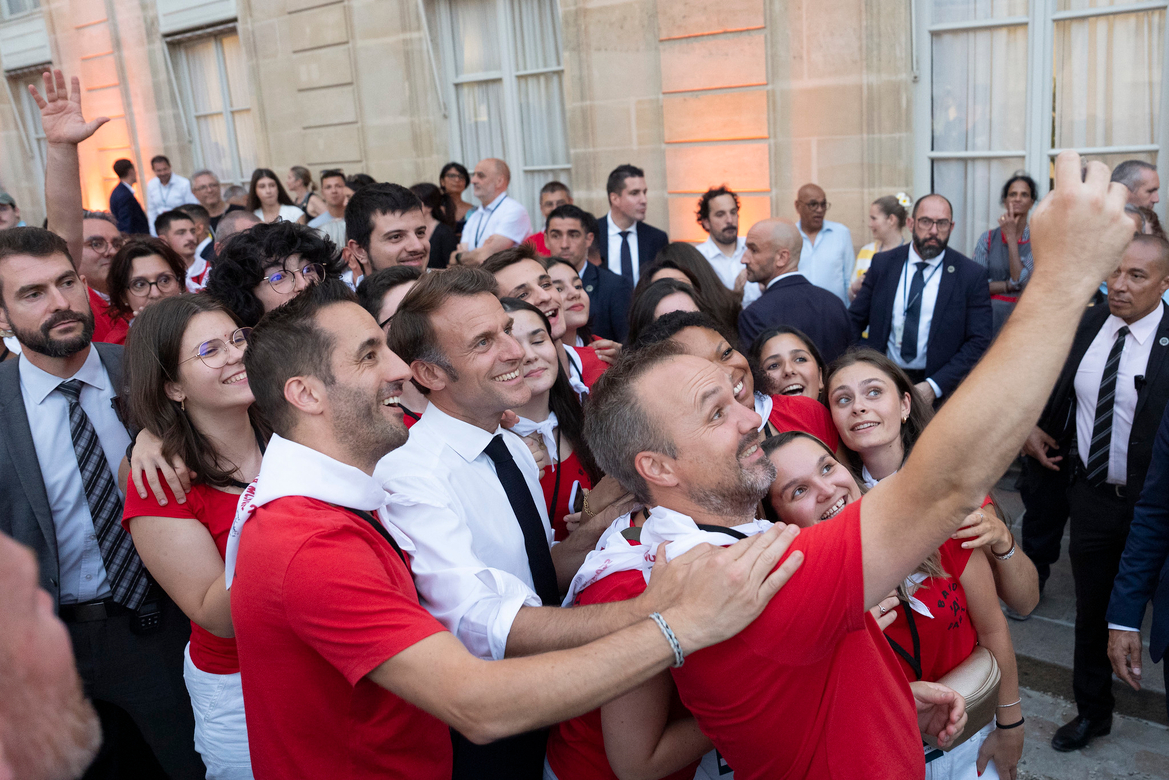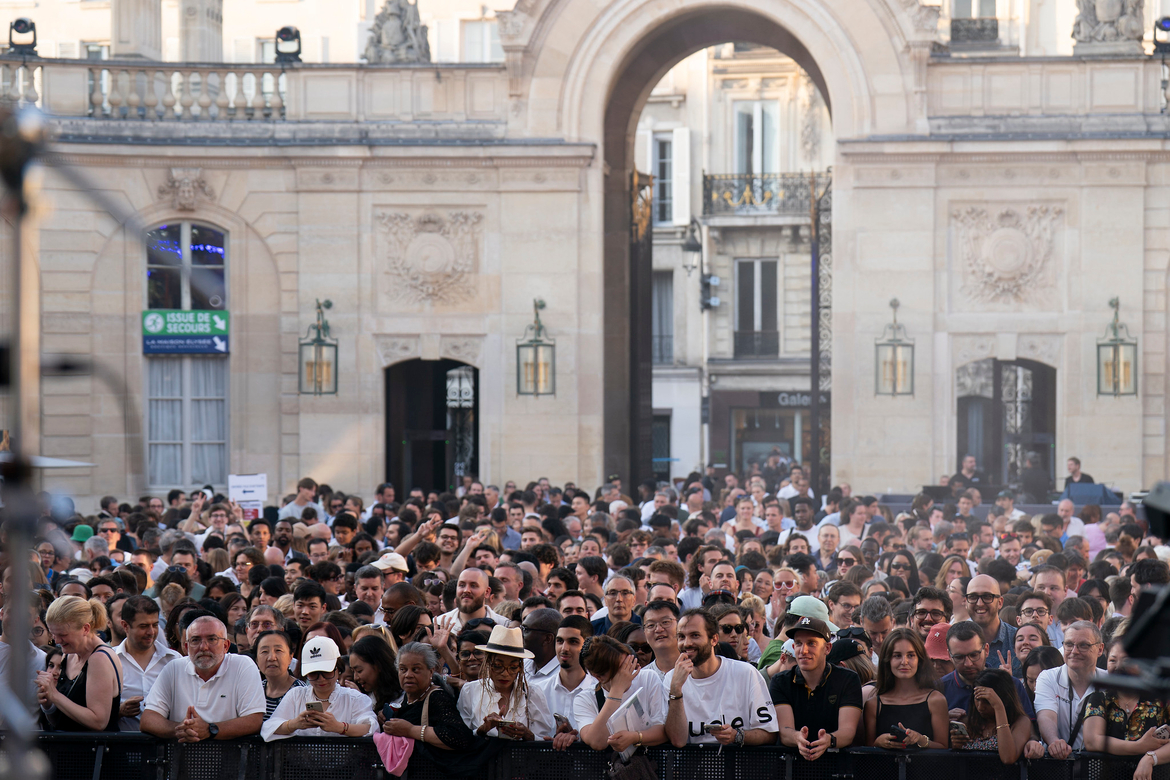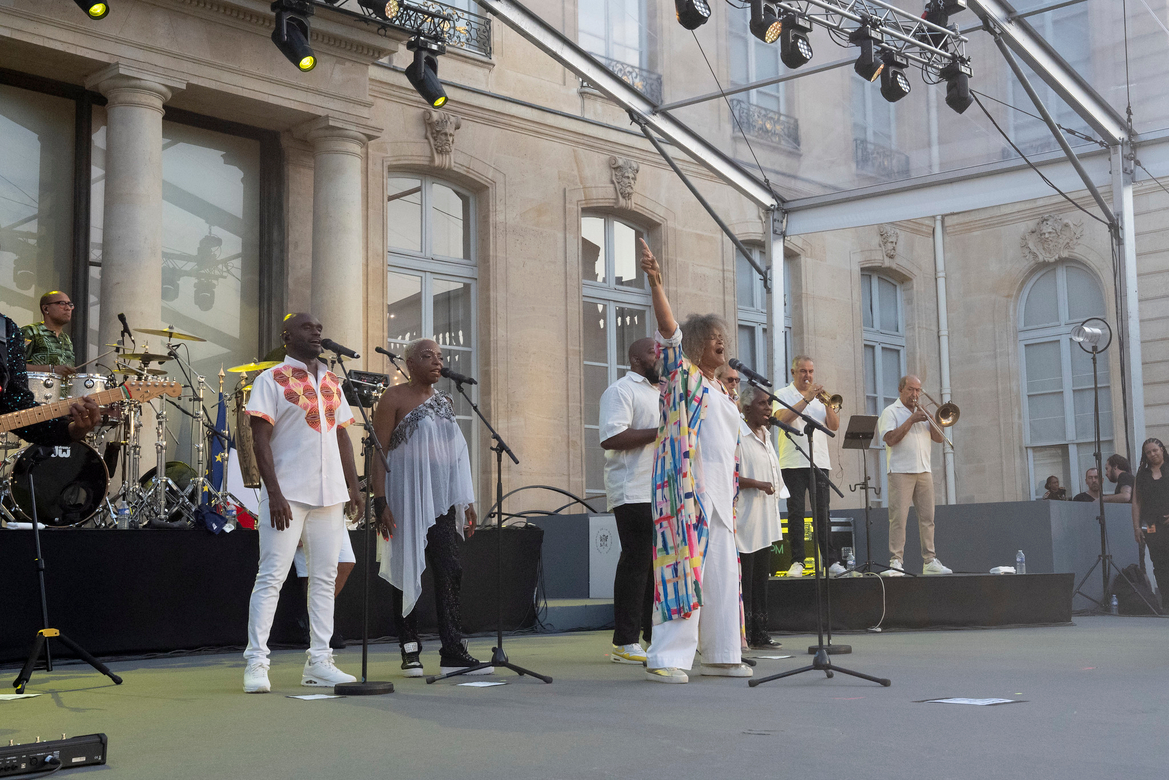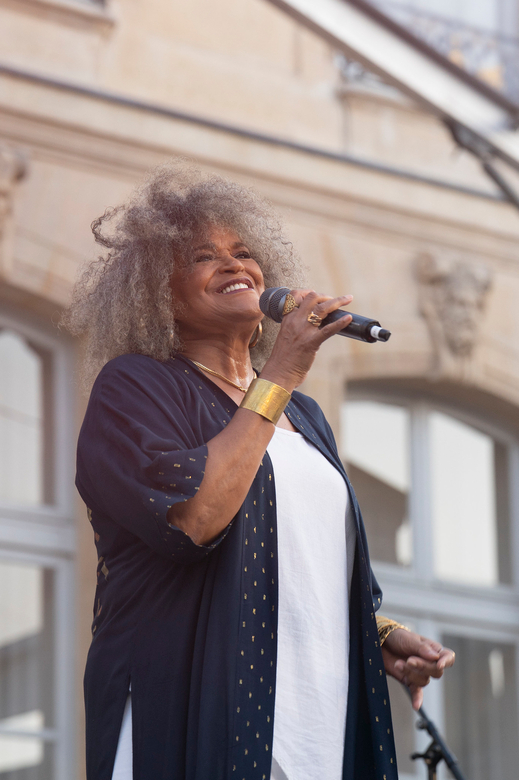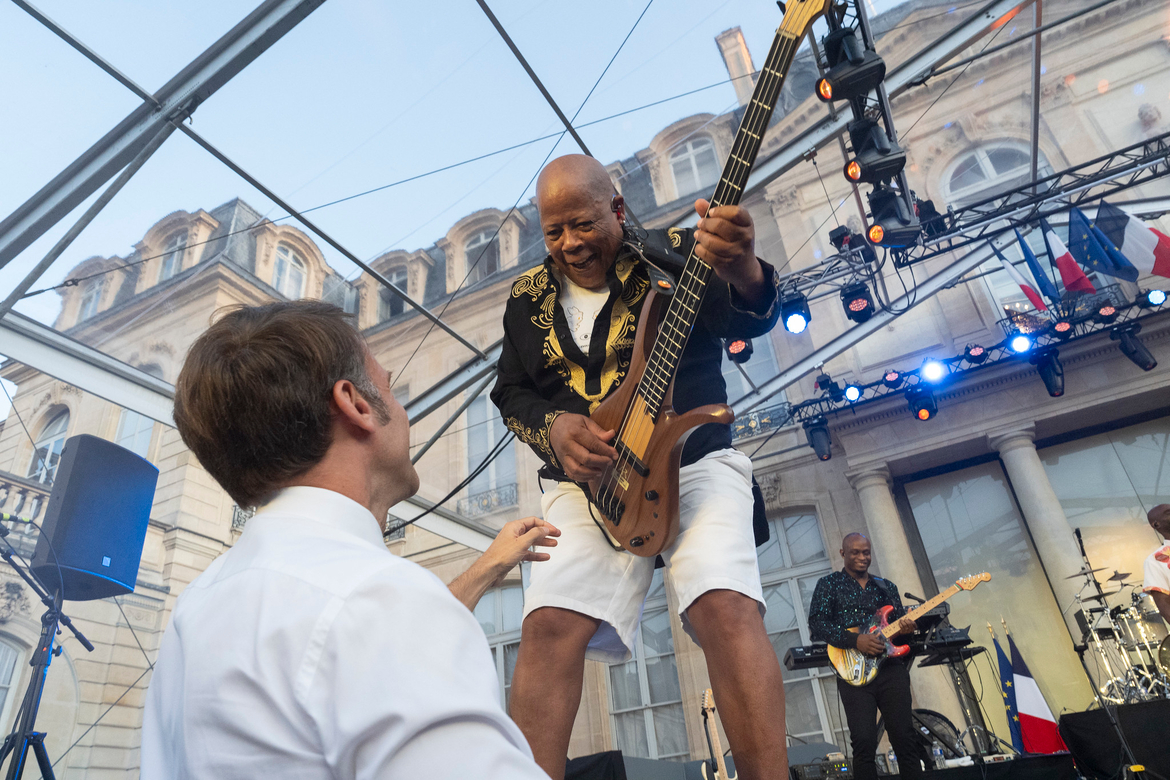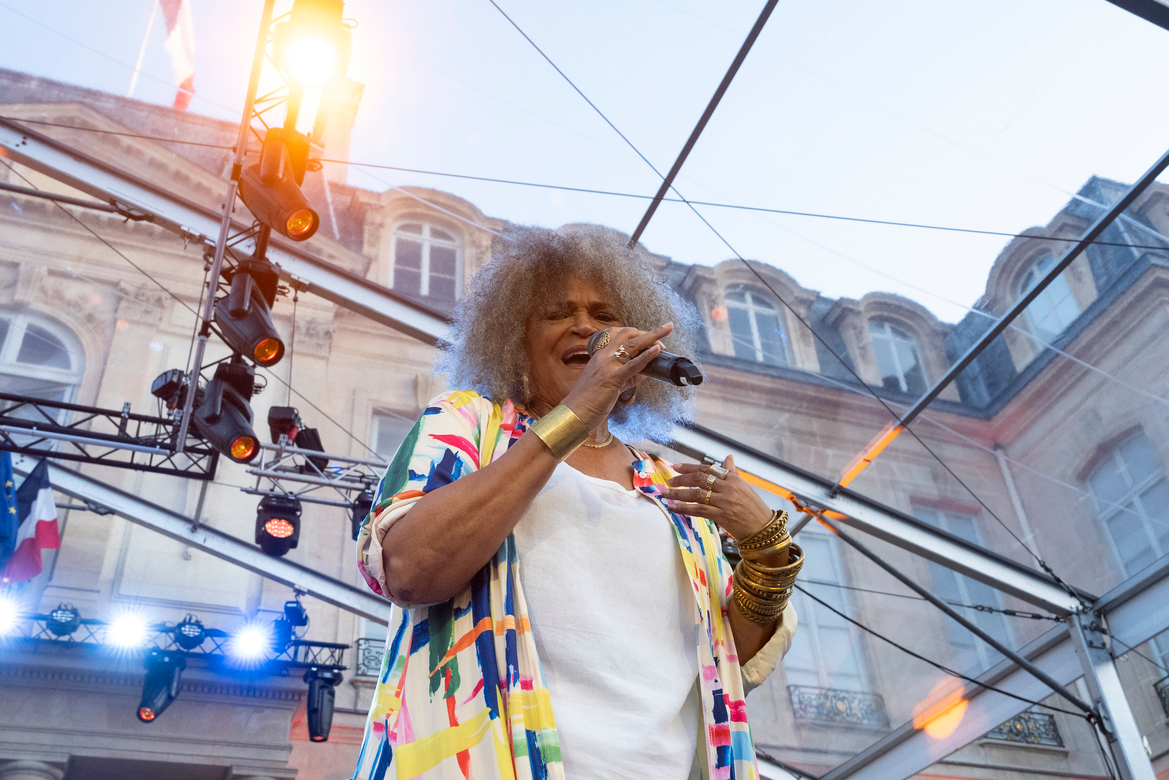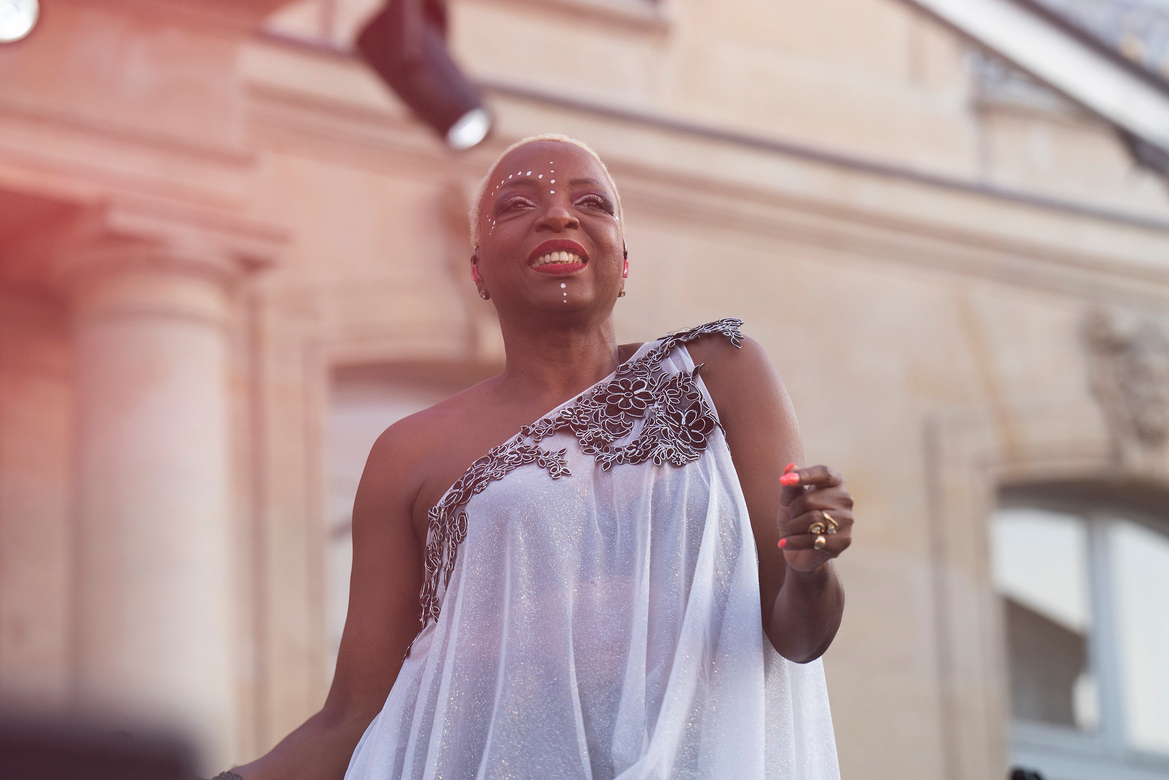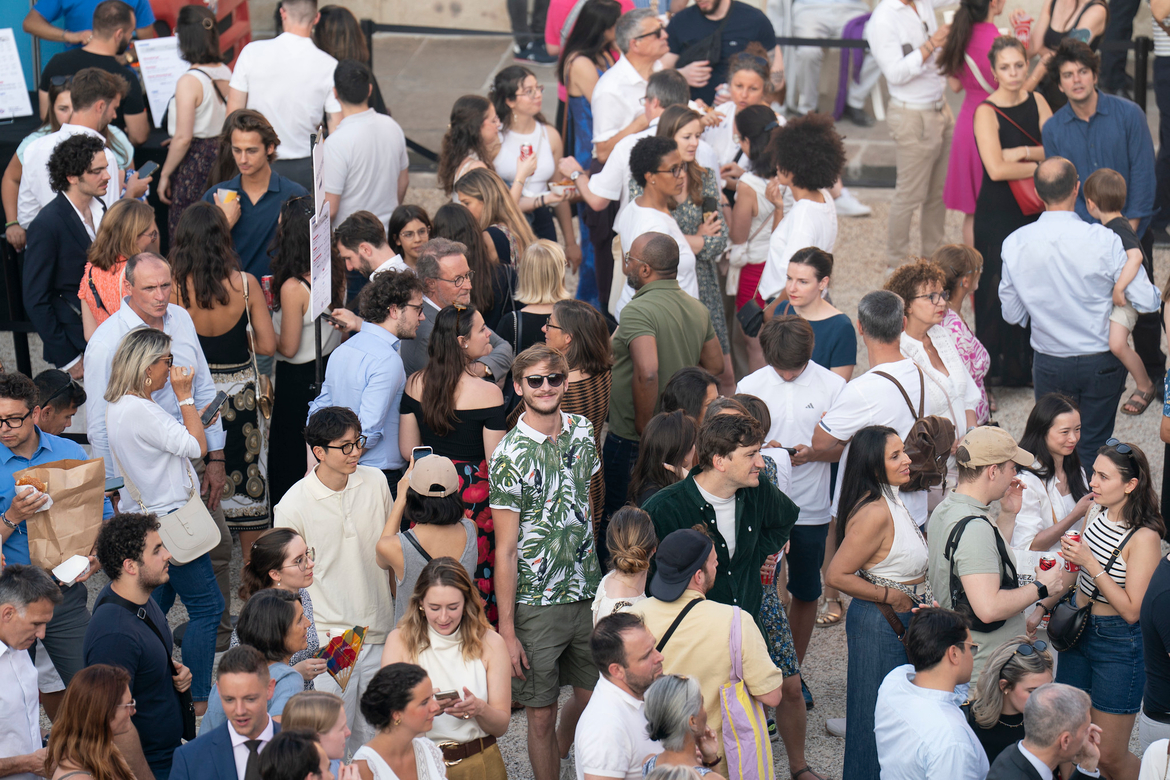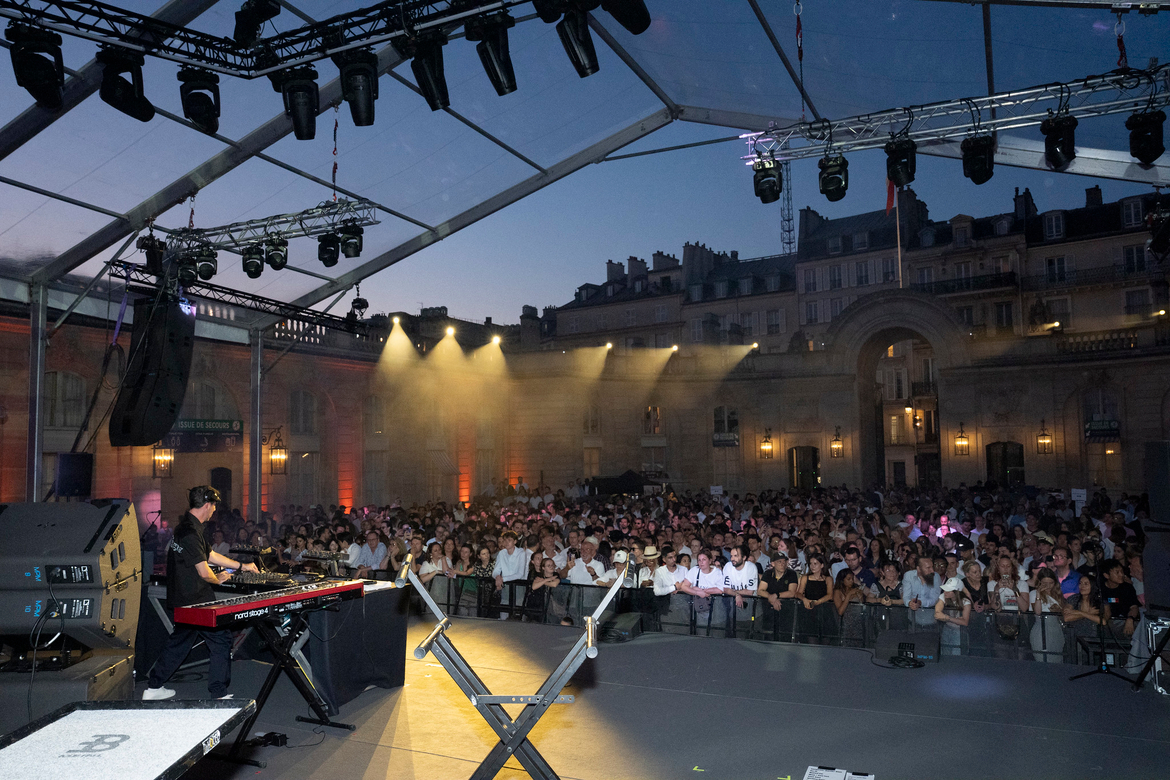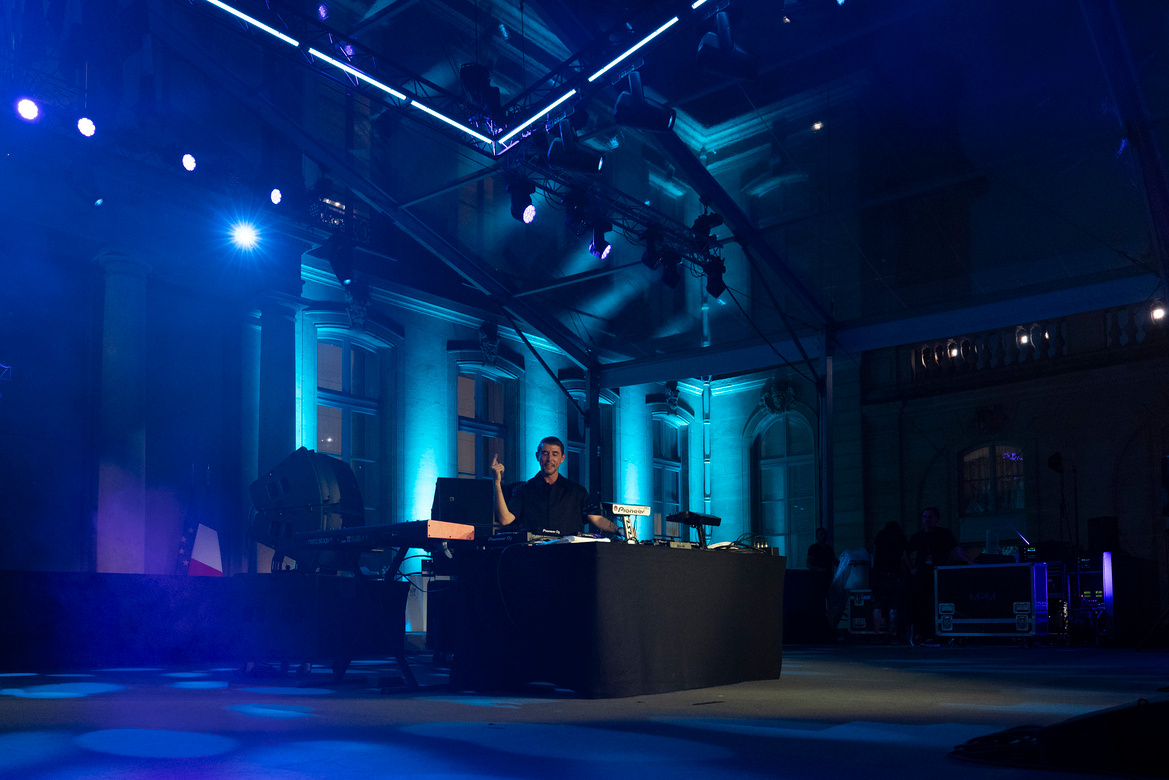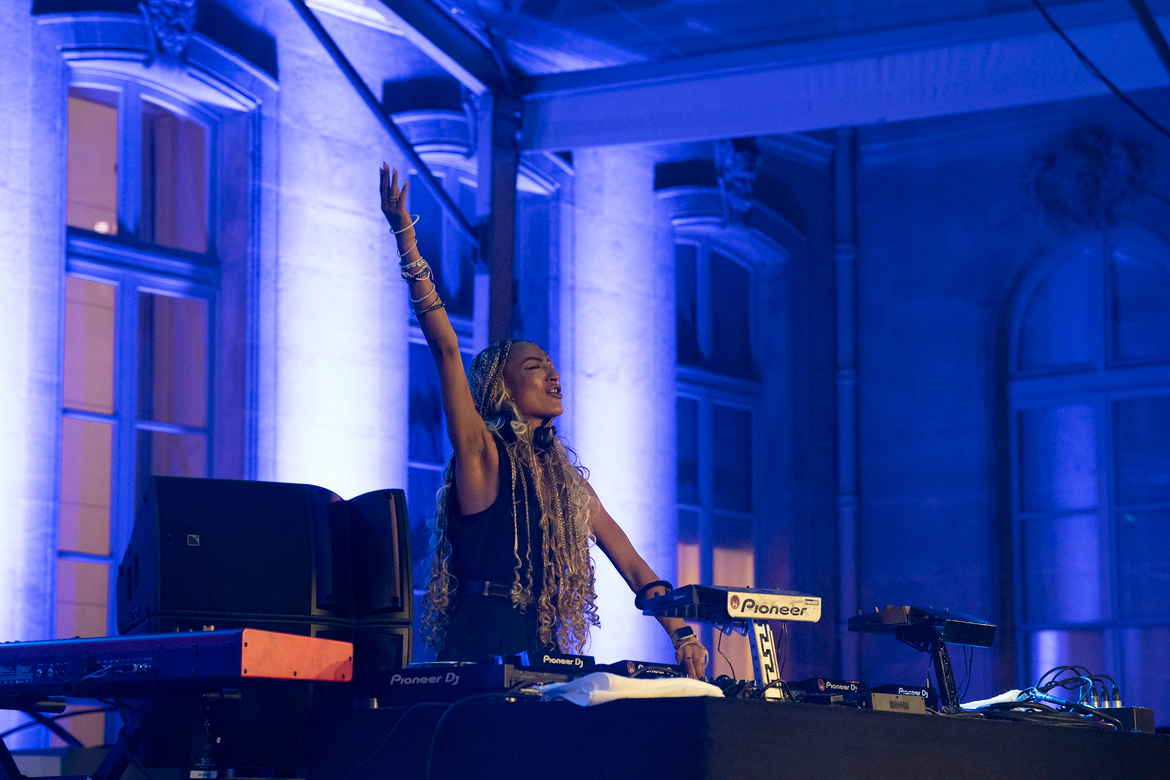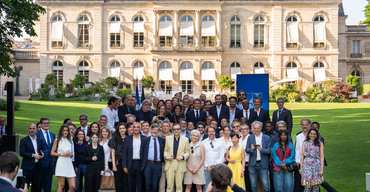Le Président Emmanuel Macron a reçu les acteurs de l’industrie musicale internationale, réunis à Paris à l’occasion de la première édition de la France Music Week, ce vendredi 20 juin 2025, à l’Élysée.
Lancée par le Président de la République lors de l’édition 2024 de la Fête de la musique, la France Music Week s’inscrit dans la stratégie de long-terme pour l’attractivité de la Nation et le rayonnement de notre culture et de notre langue française.
La France Music Week est pensée comme une manifestation populaire avec des concerts et des initiatives sur tout notre territoire. Une semaine de célébration qui se conclura par un grand concert, le soir de la Fête de la Musique, dans les jardins du musée du Louvre.
Cet événement retransmis sur France Télévisions accompagnera le retour de la Vasque dans le ciel de Paris, héritage de nos Jeux Olympiques et paralympiques.
Revoir la prise de parole du Président :
20 juin 2025 - Seul le prononcé fait foi
Réception des acteurs de l’industrie musicale internationale à l’occasion de la France Music Week.
Madame la ministre de la Culture, chère Rachida,
Monsieur le ministre, cher Jack, Mesdames,
Messieurs les parlementaires,
Ladies and gentlemen, dear friends, dear artists, professional partners, distinguished guests.
Dear Pharrell, how are you? Thank you so much for being here, I'm sorry keeping you waiting. And I'm very pleased to welcome you in this garden of the Élysée Palace, in this house of the Republic. Last year, at the occasion of this Fête de la Musique, invented in 1982 by Jack Lang, which is now an international event, we decided to launch this Music Week. I wanted to thank you for being here, but as well having participated in this common work, where the intention was to try to share analysis about the dynamics of your, creation, business, sector, and try to choose France for music as well, which is obviously one of my main objectives. And some of you are French players and entrepreneurs, some others are US, Asian, African, European entrepreneurs, and I'm happy that all of you can be here. And I would like to thank the team of the Centre National de la Musique at the Ministère, merci beaucoup Jean-Baptiste, du Ministère.
As you know, our intention, just to give the perspective, is in fact to do, progressively, with music what we did for cinema. Because this is a very relevant model, where in fact we managed to finance and preserve on the long run the financing of the whole industry, and preserve the diversity of this industry, and I think this is what makes sense. Obviously, I do thank, as well, the Ministry and all the participating regions and all the professionals.
By coming together, I mean artists, producers, broadcasters, researchers, platforms, innovators, decision makers, you exchange visions, and I think started to build a common view. So first, I think this Music Week does make sense, due to the fact that our country welcomes and fosters entrepreneurship. It's part for me of the broader attractiveness of the country. During the past six years, we've been number one in terms of attractiveness in Europe. We launched Choose France now 8 years ago, and I want to do exactly the same in some few sectors, and music is part of them.
This is why I really believe that we can do much more, and we have a lot of assets in this country to clearly do much more in terms of attractiveness. We have talents, we will preserve an economic framework and the stability, and as well we have a lot of key assets, just to mention one of them, low carbon, pilotable energy, which is clearly an asset for a few sectors.
Second, we are clearly a nation where culture and language does count, as you know. And I would not here just remind you the Olympic games and the Paralympic games, or Notre-Dame de Paris, or what we provide with Francophonie. But clearly, the great cultural events are very important in this country, and clearly the relationship with our language is absolutely key, and this is why we have this perspective.
Speaking about the Francophonie, I want to thank Canada and Quebec, obviously, to be here with us, Monsieur le délégué général, and work clearly with all of us on that. Because Paris is a global capital of the arts and creativity. And from fashion to music, from heritage landmarks like Notre-Dame de Paris,
Third, clearly, we have this relationship with art and creativity, as I mentioned, and it's part of the legacy. Obviously, your sector, clearly your sector and your market will be an expansion during the years to come. I mean, in the 20 years to come, a lot of analysis clearly identifies the fact that this market will double. This is why, beyond the fact that this market is very vivid, I mean the French and the European one, we want to help our key players as well to benefit from these global dynamics, largely focused in Asia, the Gulf, Latam, and some other places. This is why we want, clearly, to accompany to export our key players in this approach.
Finally, because France upholds values that matter to music, and we are the land of cultural exception. I have to say it's no more even cultural exception because we managed to make it the European rule. Because a few years ago, when a lot of people wanted to revisit this cultural exception, we fought very hard with some of you, and we managed to deliver at the European Parliament the preservation of the copyright and the protection of the artists.
I think there is no model where you can sacrifice clearly the copyright and the protection of the artists. Obviously, we have our SACEM, and we support the diversity and richness of artists, but as well of our festivals all across the country, and want to preserve as well independent labels and champion creative work. This is all the more powerful now thanks to the creation of the Centre National de la Musique, as I had committed and I just mentioned. This is why the intention is clearly to preserve the sustainability of the financing and progressively move towards a model equivalent to the CNC. This is what makes sense for all of you.
Beyond that, since this diversity, some of you are as well a great success of innovation and entrepreneurship, Believe, Deezer. Some of you clearly are part as well of the French tech and delivered wonderful success. This is why, as we are nations of creators, entrepreneurs and artists, we bring a French touch to today's and tomorrow's music - innovating while staying true to our value. The Minister just unveiled a very important fund launched with BPI, a 500 million and 5 years long plan for the sector, which will make us able to foster music industry in France.
The idea is to make investment, to leverage this fund, to take participations with different types of instruments, but to accompany the dynamic for the export but as well for building up of the whole industry. We need this French touch, especially now, given the immense challenges of your industry. I mentioned the dynamic of this industry and the positive trend.
I would, before ending, I just want to flag some of the critical issues you perfectly know. First, obviously, the rise of streaming, no more the rise, but you experienced the rise of streaming during the past two decades, and shift from buying to streaming. This means that you had to readapt yourself, and very clearly, because we protected artists, because we found a way, or at least we started to find a way, to have a better protection, I think things are really changing. First, because a lot of you are building sustainable models, where a much better financing.
Second, because this calls for a critical examination of revenue sharing models, and the market centric model based on listen counts, which tends to concentrate value among the most played artists, and alternatives such as the artist centric or user centric models, and some of you are great inspirators of this change, championed by platforms like Deezer, by the way, deserve our full attention. And clearly, in the first rules, the first generation of rules, we have well-known bias, and we have to correct them in order to have a fair sharing of the revenue between all the different sorts of arts and artists. We have to follow up this work, and it's very important to have a common view progressively, and to deliver as well a common European approach.
The second challenge is that of mega concerts, and we do our best to accompany the greatest artists in that, in stadiums and arenas, which are completely reshaping the industry's balance. These are spectacular successes, and we are very proud to host them, such as Beyoncé's yesterday in the Stade de France. But they can obscure underlying vulnerabilities as well, midsize venues, festivals, and local stages are struggling to keep up with rising costs. It's very clear that this new model is very fruitful, but we have as well to organize ourselves in order not to sacrifice what clearly is a strength of the French model and part of this diversity I mentioned. Our network is clearly essential, and it is the foundation of access to music for all across the entire country. What makes France a land of music, and I think this is a perfect complementarity. This is not, I would say, just an alternative, and we would make a mistake by just focusing on one part of the picture.
The third challenge obviously is artificial intelligence. And I remember that when I came, beginning of this year, in the AI summit, he made a comparison with alcohol, if my memory is right, saying, "I mean, it's not inevitable, it's not bad in itself, but it's just about responsibility." And I think this is a fair comparison.
Because creation and innovation are not the opposite, but the history of music is one of constant reinvention. Music clearly has always been at the forefront of change. Today, AI is no longer a vague future, it's clearly a reality. This is probably why so many people want to procrastinate in the way to implement what we started to do, because this is a reality.
Platforms employ AI to enhance listening experiences. Collective right organizations use it to optimize royalty distribution, and producers rely on it to understand audiences, refine strategy, design, as well as smart tools. Our view is clearly to build together innovation and smart regulation. The mistake we should not make on AI would be first regulate, because clearly we are lagging behind. We are trying to bridge the gap, but clearly if you compare with the US and China, we have to do much more, innovate much more, and welcome here a lot of innovation. That's why we fight hard in order to have much more LLMs, much more secret approach, but as well a lot of data centers and all the infrastructure of AI. But at the same time, we want an ethical approach. The question for us is not to abandon the rest of the model because of AI.
It's clear that now we want to work, and we will deliver, as we did a few years ago on copyrights. To deliver in order to protect clearly the rights of our artists and to make, I would say, the marriage between creation and innovation sustainable as well. And very clearly, unregulated generative AI could lead upstream to a form of expropriation of original work and downstream to a dilution of the value of human creation.
Here are the two main risks, and I'm not exclusive. We all share this vital interest that we have to preserve our value and the model, I mean, which makes your industry so strong and meaningful. This is why we aim to be at the forefront and by being able to boost innovation and defense IP rights at the same time. This is another en même temps. And with EU innovator, we want to work in the month to come in order to build this right approach, which is for us is the only one to be sustainable.
On AI, I will be clear, we will do our best to be clearly part of the champions of this world, in this industry. We want to allow all the artists, but as well all the key players of your industry to use AI. But we want to have clear rules in order to preserve clearly the rights of the artists and make a clear distinction.
I don't want to be longer, but here are the key elements I wanted to share with you. And I wanted to tell you as well that based on all your discussions and the first consensus you had during this music week and especially the work you did today, clearly, they're all very clear conclusions, and we will engage with our key European partners in order to have a common approach, common actions, sometimes common action at the European Commission and European Parliament.
The idea is as well to follow up the key projects you have because we want more of you to invest in this country, to be part of the strength of the ecosystem and to clearly follow up this dialogue.
I don't want to be longer; I want you to enjoy this Fête de la Musique at the Élysée. It will be today because of the Tuileries, because it seems that you are making a big party on the other side of the garden. We are not authorized to make a Fête de la Musique the 21st. For the first time, it will be the 20th.
Je veux vous souhaiter le meilleur pour tous et toutes et vous dire combien, voilà, avec le Premier ministre, avec le Centre national de la musique et tous les acteurs qui sont là, je souhaite que l’on fasse encore davantage pour la musique en France et au-delà, et qu’avec vous, on puisse relever ces défis.
Je souhaite une très belle Fête de la Musique, long Live France Music Week!
À l’issue de cette cérémonie, le Président de la République a inauguré la fête de la musique au Palais de l’Élysée.
